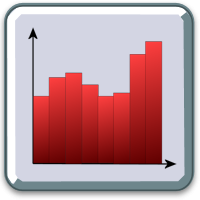Ask Professor Puzzler
Do you have a question you would like to ask Professor Puzzler? Click here to ask your question!

Every year that I teach Physics I run into a small problem with the labs my students do. Here's the problem. My students will collect data (and the issue happens most often when they're timing something) and then they'll look at their data and say, "Wow! One of those points is way off from the others!"
For example, their data points might be the following times in seconds: 4.2, 4.6, 4.3, 4.8, 7.2, 3.9
As they look at those data points, they'll recognize that most of them are in the vicinity of 3.9 to 4.8, but there's one value (7.2) that is way off from the others. Obviously something went drastically wrong with that trial!
So what do I tell them? I'd like to tell them, "Use your statistics knowledge to determine the outliers." Outliers are points like 7.2, which are clearly outside the reasonable range. That's what I'd like to tell them, but I don't, because I know perfectly well that many high school science students have not yet learned enough statistics to calculate outliers.
And I have no intention of spending my Physics class time teaching statistics!
So what do I do? I say to them, "If it looks ridiculous, dump it."
Now, that's a quick approach, and it saves a lot of time, but it's not really a "good" approach (although I'm not the only science teacher that does it!). Why is not a good approach? Because good scientists try to avoid using intuition and guesswork when selecting their data. That kind of fuzzy thinking can result in people massaging their data to make it say exactly what they want it to say.
So this year, I decided it was time to resolve that problem. Not by teaching my students how to find quartiles, interquartile ranges, and outliers. No...I decided to create a calculator that they could enter their data in, and have the calculator list their outliers.
And, while I was at it, since I realize these kinds of tools can be very helpful for both teachers and students, a whole section of statistics calculators was added to the site. These include calculators for various means (arithmetic, geometric, and harmonic), as well, as standard deviation, variance, and other useful statistical quantities.
You can find the calculators here: Professor Puzzler's Statistics Calculators.
